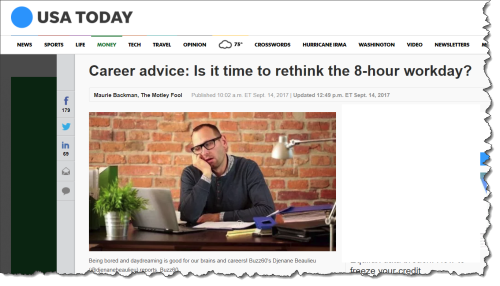Is the 8-Hour Workday a Mistake?
In the past, this space has highlighted the ideas of highly-successful people who think there���s only one kind of day to work: hard and long.

As a matter of fact, according to an article over at USA Today, a full 40 percent of U.S. employees are toiling away at their labors over 50 hours each week, and 20 percent go over 60 hours a week. Clearly, American workers are not slackers.
But that same article reflects on another idea ��� that maybe putting in lots of hours actually hurts productivity as it relates to certain kinds of jobs.
For one thing, as the article points out, some of the greatest intellectual figures in all of history, like Charles Darwin and Charles Dickens, were known to hack away at their creative brilliance for just a few hours each day. Author and researcher Alex Pang goes as far as to say that four hours is the ���optimal amount of time��� for which one should work each day if the labors involve a great deal thinking and concentration.
If your work is more of a repetitive nature, or otherwise does not demand that you apply much by way of creativity or imagination, then it���s likely you can stay productive throughout the duration of a long work day. But if you have to apply a great deal of mental acuity to what you���re doing? Fours of that each day is about the limit, if you���re interested in working at your best.
The real truth, though, is that in typical Corporate America, even the most intellectual of professionals has much of their day filled with decidedly uninspired obligations, like meetings and answering emails. So it���s likely that four hours of real brain work is all they���re getting in, already.
Still, there���s a lesson here, particularly for those folks who work for themselves, about doing everything one can to streamline the day and ensure that, as much as possible, your highest and best work is receiving the appropriate priority when it comes to the management of your time.
By Robert G. Yetman, Jr.



